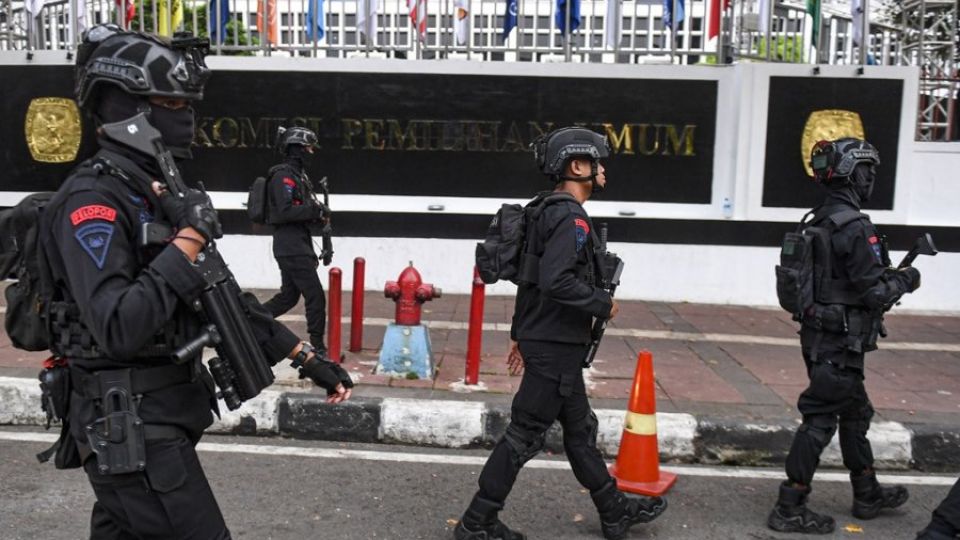December 12, 2023
JAKARTA – Activists say the three 2024 presidential candidates must offer concrete strategies to address Indonesia’s flagging fight against corruption, democratic backsliding and unresolved past human right abuses in the first debate of the campaign season scheduled for Tuesday evening.
The televised debate, the first in a series of five before voting day in February, will cover issues of law, corruption, governance, democracy, human rights and tolerance.
Of these topics, concerns over the country’s fight against corruption loom large, particularly after lawmakers and the government passed a revision to the Corruption Eradication Commission (KPK) Law in 2019 that effectively defanged the agency.
Recently, then-KPK chief Firli Bahuri was named a suspect by the Jakarta Police for allegedly attempting to extort former agriculture minister and graft suspect Syahrul Yasin Limpo, dealing a major blow to public faith in the KPK.
In addition, six ministers and one deputy minister in President Joko “Jokowi” Widodo’s cabinet have been implicated in graft cases in his second and final term.
In the latest Corruption Perception Index (CPI), Indonesia slid four points to a rating of 34 – marking an increase in perceived corruption – the biggest decline since before the fall of the New Order regime in 1998 and one of the worst year-on-year performances in the region.
“In the first debate, I’d say all candidates should offer clear commitments to strengthening the fight against corruption and restoring the KPK’s independence, including by revoking the 2019 revision to the KPK Law,” activist Agus Sunaryanto of Indonesia Corruption Watch (ICW) told The Jakarta Post on Monday.
Read also: Presidential candidates ready for first debate
Agus also urged the candidates to support expedited deliberations on the asset recovery bill, which seeks to provide methods to prevent corruption and money laundering.
Shrinking civic space
Activists have also sounded alarms over democratic backsliding and contracting civic space in recent years, as an increasing number of citizens face criminal penalties for political speech.
A 2020 study by pollster Indikator Politik Indonesia found that some 70 percent of Indonesians felt more afraid to publicly voice their opinions on current issues than they had in previous years.
A 2022 poll by Saiful Mujani Research and Consulting (SMRC) found that the number of people who were satisfied to the state of Indonesia’s civil liberties had dropped by 16 percent in Jokowi’s second term, from 79 percent in April of 2019 to 63 percent in March of 2022.
Read also: KPU makes last-minute changes to debate format
At the end of last year, the House of Representatives also passed a controversial revision of the Criminal Code that make it an offense to insult the president, the national flag or state institutions. The law also requires people to obtain a permit to hold a protest and bans spreading views counter to state ideology Pancasila, among other contentious provisions.
Muhamad Isnur of the Indonesian Legal Aid Foundation (YLBHI) demanded that the candidates vow to remove problematic provisions from the new Criminal Code.
“I hope they realize that we have been seeing a severe democratic regression in recent years. It’s better for them to show their commitment to ensuring that people can feel safe to voice their opinions without the threat of excessive criminalization,” Isnur said.
Amnesty International Indonesia executive director Usman Hamid urged the candidates to support the resolution of past gross human rights violations, in particular by establishing an ad hoc rights tribunal.
He also called on the candidates to back policies to resolve armed conflicts in Papua and to prevent authorities from using excessive force when evicting residents for government projects.
“It’s very important that all candidates promise not to sacrifice the safety of the public, including children, for infrastructure development,” he said.
Commitments so far
All three candidate pairs, according to their election manifestos, share a commitment to strengthening Indonesian democracy, human rights and the fight against graft.
But they did not detail their strategies or mention anything about the 2019 amendments to the KPK Law.
The General Elections Commission (KPU) has selected 11 experts in law, human rights, religious studies and democracy to serve as panelists for the Tuesday debate and formulate questions to be posed to the candidates.
News anchors Ardianto Wijaya and Valeria Daniel of public broadcaster TVRI will serve as moderators.
Read also: Elections body criticized over debate confusion
Political analyst Arya Fernandes said that given the topics of debate, presidential candidate Prabowo, who is running with Gibran Rakabumin Raka, was likely to be at a disadvantage because of the controversies surrounding the pair’s candidacy, including a divisive Constitutional Court ruling that paved the way for Gibran’s VP nomination.
“I think Anies will go on the offensive to bring up recent controversies, such as Indonesia’s declining democracy and corruption index,” Arya said.
Analyst Adi Prayitno said Ganjar was likely to have the upper hand in terms of policy expertise during the debate, given that he was running with Coordinating Political, Legal and Security Affairs Minister Mahfud MD.
“Even so, a debate is not just about the substance, it is also about [delivery],” Adi added.
He predicted that Prabowo might have to face questions about human rights accusations related to his military career, while Anies might encounter questions on graft allegations surrounding the Formula E electric motorsports race, one of his flagship programs during his tenure as governor of Jakarta.


